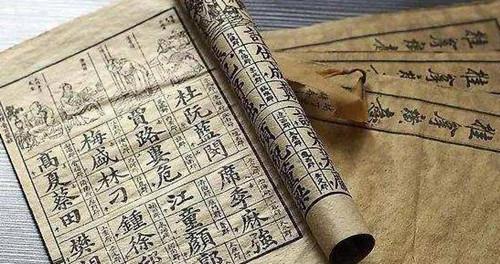
Surnames are essential from the moment everyone is born, but there are also "unpopular" and "common" in surnames. Like Wang, Li, Zhang, Liu, Chen, these very populous surnames, we can pull a few people on the street, there is a high probability that we can pull these surnames.
The unpopular surname is different. In 2015, the official release of China's latest population ranking of surnames, the last three surnames are: Yue (to be reversed upside down, pronounced "Ya"), dead (yes, some people surname death) and difficult (pronounced the same as "go"). It is estimated that most readers have not seen them at all in their lives.
However, although these three surnames are unpopular, they are not misleading. There are three surnames in our country that are particularly easy to misunderstand as Japanese surnames, which is very depressing. Xiaobian bet that after seeing them, some people must have doubts: this is originally a Japanese surname! Without further ado, let's look at the first surname.
First surname: Higashino. Yes, it is the same "Higashino" as Keigo Higashino, who wrote "White Night". In China, Dongye belongs to the typical compound surname, how old is this surname? Let's start with a story. During the Spring and Autumn Period, a man named Higashino Ji ran to lu zhuang gong and introduced himself, saying that his driving skills were particularly good.
As soon as Lu Zhuanggong heard this, he asked him to drive around and demonstrate. This Dongye Ji drove the car forward and backward, and performed very happily, so that the minister Yan Yan saw it and told Lu Zhuanggong that his car was definitely going to overturn. Sure enough, Higashino Minoru patronized the performance without considering that the horse was too tired to do it, and finally rolled directly off the car.
This is the famous allusion to the "Higashino Minoru". This allusion shows that the history of the Dongye surname in China is not generally long, and Confucius lived in the era when people with the Dongye surname were already moving around. So where does the Higashino surname come from? The "Dongye Zhi" records that during the Western Zhou Dynasty, Zhou Gong ji dan was sealed in Lu.
But he did not go to the fiefdom, but his son Bo Yan went and became the Duke of Lu. Bo Bird gave birth to 3 sons, the youngest son is called "Fish", Bo Bird took good care of the younger son, and gave Higashi Noda to him as an estate. Then "fish" refers to the land as a surname, changed the surname to "Dongye", passed down from generation to generation, and can still be found in Shandong today.
Second surname: Niigaki. Seeing this surname, has the sweet smile of a Japanese actress appeared in front of everyone? However, it is not a Japanese monopoly, and we will not argue where the Japanese Niigaki surname comes from, but only domestic. The Chronicle of the Wei Dynasty records: "... In nine years, Qin pulled out the city of Xinyuan and Quyang. ”
This means that the State of Qin snatched away the "New Wall City" of the State of Wei. The word "New Wall" means newly built wall in ancient Chinese, but how early did the surname appear? There is also a relevant record in the "Records of History": "The King of Wei sent the general 'Xinyuan Yan' into Handan. "As early as the Warring States period, there were people with the surname Xinyuan in China.
Due to the lack of information, it can only be roughly speculated that the surname Xinyuan appeared at the latest in the Zhou Dynasty. The "Book of History and Feng Zen" also mentions that during the reign of Emperor Wen of Han, a warlock named Xinyuanping ran to the palace to pretend to be a ghost, and finally Emperor Wendi of Han found out that he was a fraud, and in a fit of anger, he destroyed The whole family of Xinyuanping. This surname is now very rare in China, less than the giant panda.
Last last name: Wooden Gate. The surname looks odd, literally a door made of wood. There is no shortage of surnames in Japan that contain the word "ki" or "gate", such as Kimura, Kinoshita, Daimon, and so on. The surname Ofe is relatively rare, and it is easy to be mistaken for a Japanese surname at first glance.
In fact, Wooden Gate is also a compound surname derived from ancient China. The "Surname Kaoliu" records: "Wei Zi Xian Ben Jin, entrusted to the wooden door. He is a descendant of the Wei clan, the In clan. "This surname once appeared in Henan in ancient times, but now it is more difficult to find, I don't know how many people in the folk take it as a surname."
In fact, China's surname culture has a long history, each surname has a "back story", easy to misunderstand the surname is definitely more than the above three. If we encounter an unpopular surname in life, don't be surprised and doubtful, after all, there are too many situations in which the same word ancient and modern meanings are completely different...